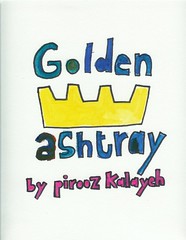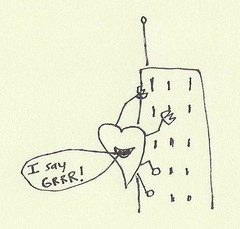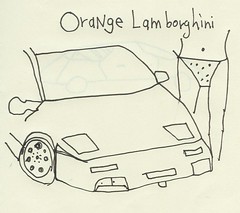
Mrs. Kim pulls out a wooden box and puts it at the center of her dining room table. It is wrapped in the traditional Korean fashion, with a silk fabric pulled over its base, and the fours remaining corners tied in a topknot to mirror the hairstyles worn by Korean men 2,000 years ago. Not to disrespect the face of the package, which is considered synonymous with the face of whom the gift is being gifted, she faces the package towards me, and carefully unties it to reveal a mark of authenticity printed on its interior. She points to a line of Hangul and recites the artist's name for me to repeat.
"Sun Jook Oh," she says.
"O," I say.
"No, Okh!" she emphasizes with a harsher 'k' sound.
"Okh!" I say.
Mrs. Kim removes the cover of the wooden crate to reveal a clay tea set, with white and blue Korean calligraphy hand-painted on the exterior of two large bowls, a kettle, and four small cups wrapped in brown paper and straw. She lifts each element from the container and puts them on the table in front of me. Patiently, she explains the proper way to make Korean tea, while her daughter, So Gee, translates:
"This tea set first needs to be warmed by hot water before any tea can be made. Once each element is properly heated, you must put hot water in one of the larger bowls. This is used to pour warm water into the clay kettle. It should not be boiling water, but like 80 degrees. Then you put the tea leaves in the kettle, which has a filter (Mrs. Kim holds up the tea kettle and points it downward, so I can see the octaval holes at the base of the spout) and pour the tea into smaller cups for drinking."
"It's complicated," So Gee adds after her translation.
"It is," I agree.
Mrs. Kim flips through a picture book by the artist. She stops every few pages to explain how the artist is an 'invisible treasure' in her country: "He is an invisible treasure like the temple that burned down a few months ago. Like the temple, artists who have contributed to Korean heritage and tradition can also become invisible treasures. All they create is considered a part of Korea and very valuable." Mrs. Kim cradles a piece of the silk wrapping in her palm. She tousles the fabric between her fingers before she continues: "I have saved this for many years for my daughter's in-laws. I want to give it to you now to give to your parents. I like you very much, Pirooz. My daughter loves you very much, so I care about you very much. It is a very happy day for me to finally give this to you."
"Tell her that I am very honored by her gift," I say for So Gee to translate. "The integrity and power of her gift is matched by who she is. I am very thankful and I am sure my parents will be as well."
Mrs. Kim laughs at my comment. She often laughs when I say things that are kind. When we first met, I took this to be a scoffing of sorts, but after this has happened repeatedly, I have now understood her reaction to be one of humility.
"Tonight, my mother will get together with friends of hers from childhood," So Gee explains. "They will get together and talk on a specific topic."
"What do you mean?"
"One of my mother's childhood friend's was diagnosed with Cancer a few years ago. Since that time, all her friends have gotten together to talk about the problems they're facing. They give themselves homework to do at each meeting. Then they relate how they've done at the next get together. All the women listen and give scores on how well they think each has done. Like if my mom thinks she scored a 20, her friends might say that she deserves an 80. Then they will give her $8.00 for a job well done."
"That's a great idea. Who came up with it?"
"My mom did. She was a teacher," So Gee laughs. "Giving homework is in her blood."
"What was your mother's homework this time?"
"Loving her son. Her homework was to love her son and see him get married safely and happily," So Gee translates.
"Did she succeed?" I ask.
"He's getting marred," So Gee smiles.
"I like this idea of a story party. I used to have these sometimes in Boulder. We didn't assign homework though. I think if I gave myself homework this summer it would be to lose weight, quit smoking, and get healthy. And love my brothers. Do not get mad at my brothers. Do not hit my brothers. Be nice to my brothers."
"That is good homework," Mrs. Kim laughs.
"Yes," I agree.
Mrs. Kim rises from her chair. She walks me to the front foray. I find my black combat boots among the small slippers and slide my feet into them. She smiles and tells me my shoes are too heavy. I agree with her.
"Did you wear these shoes for me?" she asks.
"Yes," I say.
"You didn't have to," she tells me.
Mrs. Kim escorts me down the steps of the apartment and into the courtyard. It makes me feel very privileged and appreciative. I am suddenly open to the idea of being part of this family. I suppose some people have an innate sense of what needs to be done to create possibilities. It just takes a small demonstration on their parts to bring out what we cannot see. I once thought only artists had this privilege, but now I know mothers can make Picassos too.












No comments:
Post a Comment